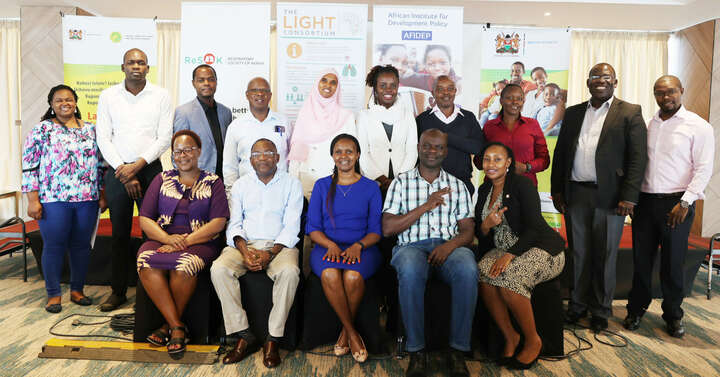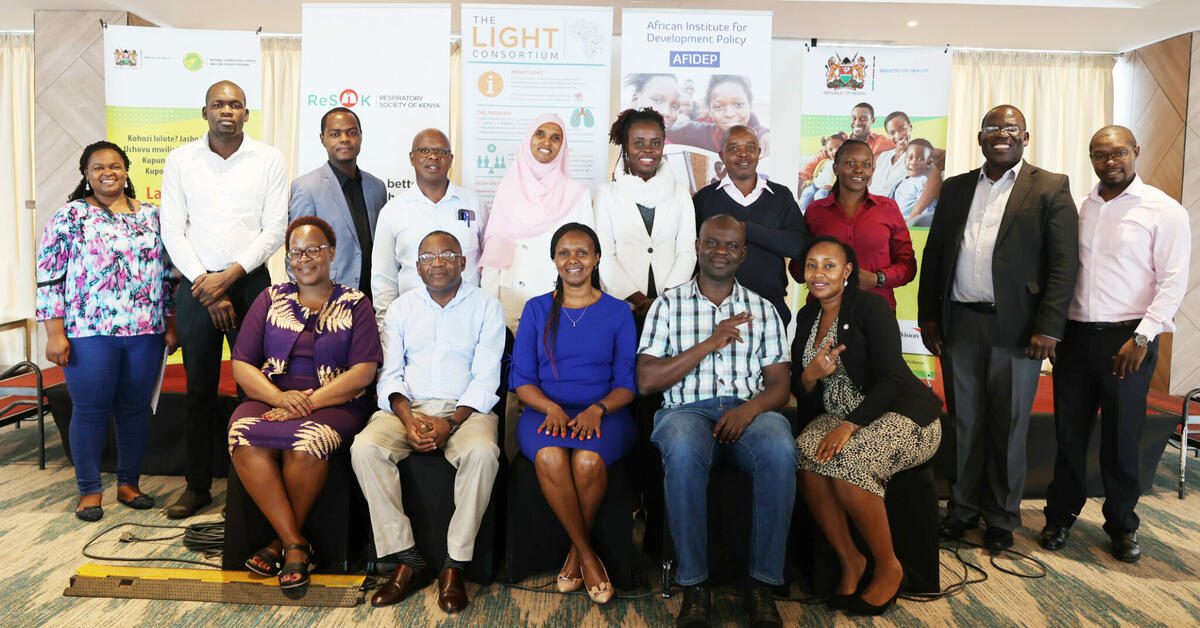
Authors: Edel Sakwa, Rhoda Pola and Felix Mbetera
In Kenya, a proactive effort is currently underway to enhance initiatives supporting the National Tuberculosis Programme (NTP) to fulfill its objectives within the country. While gender disparities continue to be a challenge in the TB response, NTP Kenya is resorting to evidence to inform the development of its policies. Achieving this requires tangible actions including open and transparent conversations, asking critical questions, and long-term commitment, as well as accessing gender-segregated data across various digital platforms and resources. The latter helps generate valuable data, facilitating informed decision-making and ultimately improving the lives of citizens.
LIGHT Consortium partners in Kenya, comprising the African Institute for Development Policy (AFIDEP) and the Respiratory Society of Kenya (ReSoK), actively sought engagement with the Ministry of Health’s National TB Programme team on January 16, 2024. This collaboration is pivotal considering the crucial role of the National TB Programme in ensuring that TB control initiatives address gender-specific challenges and promote equitable access to healthcare services at both the national and county levels.

This engagement aimed to present the protocols of two LIGHT research studies conducted by ReSoK and AFIDEP and seek partnership with the National TB Programme. One of the studies focuses on identifying the critical gaps in the TB care cascade among young people (aged 15-24 years) in Nairobi County, through a gender lens. Recognising that effective screening is fundamental along the TB cascade of care, including diagnosis, treatment initiation, and treatment outcomes, the study aims to analyse the Kenyan TB care cascade, assessing losses attributed to various gaps and determining risk factors for non-completion of screening, diagnostic and treatment among young people with TB. The outcomes of this study will guide the health systems structure to develop and implement gender-specific interventions across the different levels of care.
Speaking at the event, the acting Head of the National Tuberculosis, Leprosy and Lung Disease Programme (NTLD-P), Dr Immaculate Kathure, emphasised the importance of viewing gender through an unbiased lens, acknowledging its pivotal role in TB approaches. This could fast-track the gains achieved to end TB as per WHO’s end TB strategy by 2030. Despite the Ministry’s various programmes, the development of a protocol to help advance policies in addressing the issue of TB and gender cannot be ignored.
This was also echoed by Prof. Jeremiah Chakaya, the CEO of ReSoK who stated that “apart from Afghanistan which has more women with TB than men, globally TB is still more in men than women. Various biological, social, cultural and behavioral factors have influenced this. Addressing the gender dimensions of TB in Africa requires a comprehensive approach that considers these factors.” Efforts should focus on tailoring interventions to the specific needs and vulnerabilities of both men and women in diverse communities across the continent.
Kenya’s TB landscape shows that health policies are designed to endorse equity, human rights-based, people-centered, and participatory approaches to health and health interventions. Kenya’s National Strategic Plan for Tuberculosis Leprosy and Lung Health (2019-2023) identified specific population groups vulnerable to TB as key to a successful TB response, focusing on “person-centred care” as one of its three pillars. Despite adopting these approaches, the end-term review of the strategic plan showed that patients are largely managed in the same way with limited attempts to tailor care according to individual circumstances. This suggests a gap in the implementation of these approaches within the TB healthcare strategies.
The second research study seeks to address the policy-practice gap through face-to-face workshops with healthcare workers and TB stakeholders. The main objectives of the study are to explore healthcare workers’ understanding of and experience in person-centred, rights-based, gender-responsive TB services; explore perceived opportunities, challenges and needs among healthcare workers towards implementing these services; as well as facilitating learning between healthcare workers and stakeholders to generate opportunities.
The outcome of the study, aligned with basic ethical practices, will include enhanced understanding and will suggest good practices and recommendations with agreed plans of action.
NTLD-P is poised to undertake a comprehensive data mining initiative utilising the National TB Surveillance System (TIBU). In collaboration with LIGHT consortium partners in Kenya, the programme will systematically analyse the data in accordance with the stipulations outlined in the study protocol. Subsequent to this analytical phase, the research team will disseminate their findings through diverse platforms, including round table discussions to obtain diverse input and feedback, particularly in relation to gendered approaches applied in the study.
The data on TB screening will provide evidence of the differences between men and women in the TB care cascade and will identify the appropriate approaches that meet the distinct needs of all genders. Having this good relationship with partners will help consolidate ideas and inform the TB communities and the government in coming up with working policies. Implementing gender-responsive strategies is crucial for effective TB control and ensuring equitable access to healthcare.
The team from the National TB Programme suggested some recommendations to be included in the research study as follows:
- Include a review of post-TB complications as one of the steps in the TB care cascade.
- Incorporate findings from the “community-rights and gender assessment” to enhance understanding of gender variations across the cascade of care.
- Review of symptoms exhibited by individuals presumed to have TB and link symptoms to diagnosis status of the patients.
- Include comorbidities and substance use as risk factors in the analysis of TB patient data to understand how their impact on the overall outcome of the TB patients.
- Use of t-bu Lite data (case-based data on TB screening) and Active Case Finding data sets to explore any gender variation on screening and case finding, which are key steps in the care cascade.
- Analyse Laboratory and X-ray data that are reported in TIBU to identify any unique aspects relating to gender in the TB diagnosis.
In summary, the meeting participants reached a unanimous decision to champion collaborative work and implement a research-oriented approach to address gender-related challenges within Kenya’s TB context. The Monitoring and Evaluation (M&E) team committed to conducting data mining within a week, while closely collaborating with the LIGHT research team in Kenya for further analysis. Looking ahead, the team plans to reconvene for another meeting to discuss preliminary findings, paving the way for a subsequent broader stakeholders’ gathering. This cohesive strategy reflects a commitment to a thorough and inclusive process in addressing gender-related issues in the context of TB in Kenya.
